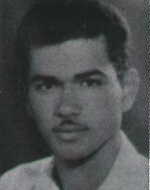Glam, Rachamim
Son of Yitzhak and Esther. He was born in 1937 in Benghazi, Libya, and was educated by his uncle, who raised him as a son in every way, from his youth to love Israel. From his youth he was full of love for Israel and thanks to the Zionist education he received from the youth movement in Libya he immigrated to Israel in 1949 as part of the Youth Aliyah. His mother came two years later. After rachamim reached the land,he developed the Hebrew language, continued his studies at the elementary school in Afula, and took responsibility for his family, by nature, was kind and willing to help all the needy and weak, and was loved by all his acquaintances and relatives. And was assigned to the Artillery Corps. During his regular service, he served as a driver. Even after he was wounded during his service, he continued to serve even though he could have been released. He would do everything he was entrusted with devotion and loyalty, and his commander would designate him as a responsible soldier, with initiative and willingness to carry out any task or task. After being released from regular service, he began to build his life as a citizen. He built his own future. Took his mother and together they moved to Ashkelon. Because he loved gardens, flowering flowers, bushes and green grass, he began looking for work in this area. He nurtured a Yaffa garden near his mother’s house and also to his neighbors, friends, and friends – he did so with great love and endless patience. At first he did not have the tools to work, but after that he began to acquire tools until he came to more elaborate tools. Thus he found his livelihood with dignity and his name came out in Ashqelon as a devoted man devoted to work and keeping his promise. After moving to Ashkelon he married and over the years they had a son and a daughter. By nature he hated idleness and lack of action. Although the work of the garden occupied him but did not fill all the hours of the day and therefore found himself a job to occupy him. He accepted the distribution of the Maariv newspaper in Ashkelon and in the surrounding settlements – and he did this work faithfully, quietly and with a characteristic smile. To the satisfaction of his employers. At the end of August 1969 he was called up for active reserve duty. On September 26, 1969, he fell in the line of duty. He left a wife, a daughter and a son. He was laid to rest in the cemetery in Ashkelon. In his memory, a club for the elderly was established in a southern housing project in Ashkelon.
